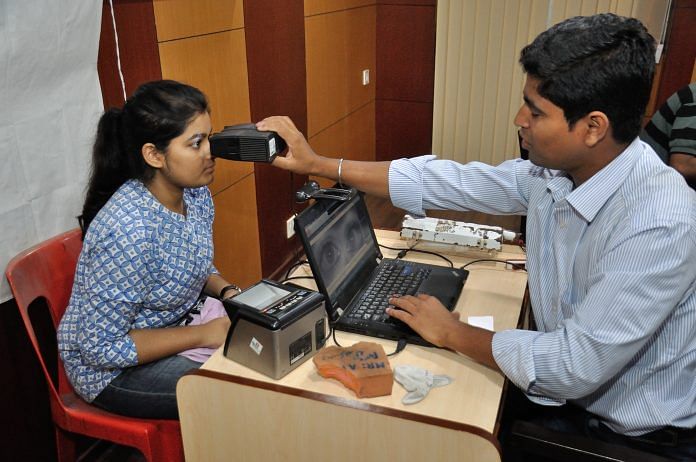Pakistan leader Imran Khan’s claims that the issuing authority was giving away voter data before polls come amid raging privacy debate on Aadhaar.
New Delhi: When Pakistan’s prime ministerial hopeful Imran Khan alleged a data breach in the country’s unique identity system, it probably triggered a sense of déjà vu among Indians, who have been grappling with a raging privacy debate centred around India’s 12-digit equivalent, Aadhaar.
Khan has alleged that the issuing authority has been giving ID data to a political party. India’s concerns too stem from the easy availability of private information provided for Aadhaar, the sole identifier of individuals for a host of services and a comprehensive repository of each holder’s data.
The Pakistan Tehreek-e-Insaf (PTI) chief’s statement provides a good opportunity to undertake a comparison of the two systems established 10 years apart that seem as similar as different.
The roots
- The Aadhaar card is issued by the Unique Identification Authority of India (UIDAI), which was set up in 2009.
- It became a statutory body in 2016 with the Aadhaar Act (Targeted Delivery of Financial and Other Subsidies, Benefits and Services).
- The first Aadhaar card was issued in 2011, and since then as much as 89 per cent of India’s citizens, or 121 crore people, have reportedly been issued the unique ID.
- Aadhaar’s Pakistan counterpart, the computerised national identity card (CNIC), is operated by the National Database and Registration Authority (NADRA).
- The government agency was established on 10 March 2000, the year it started issuing CNICs. The NADRA started to employ biometric technology on an experimental basis in 2007.
How it’s issued
The process is pretty much the same:
- For Aadhaar cards, applicants have to visit a registered card-issuing centre with ID proof, and get their iris and finger prints scanned and a photo taken.
- CNIC requires an additional attestation from a gazetted officer.
How compulsory is it?
Aadhaar is technically not mandatory, since the Supreme Court, in March, indefinitely extended the deadline for linking it with mobile phones, tatkal passports, and opening new bank accounts.
In Pakistan, CNIC is compulsory for people who are 18 and above for voting rights, as well as to get their passport and driving licence — and even to buy vehicles and train tickets.
Security issues
As mentioned earlier, both have courted allegations of data breach. According to a report by The Tribune, one could purchase Aadhaar data for as little as Rs 500. However, the UIDAI denied all claims and said card-holders’ data was completely safe.
Tribune’s Story “Rs 500, 10 minutes, and you have access to billion Aadhaar details” is a case of misreporting. No biometric data breach @thetribunechd @rsprasad @ceo_uidai @timesofindia @firstpost @IndiaToday @ZeeNews
— Aadhaar (@UIDAI) January 4, 2018
Tribune’s Story “Rs 500, 10 minutes, and you have access to billion Aadhaar details” is a case of misreporting. No biometric data breach @thetribunechd @rsprasad @ceo_uidai @timesofindia @firstpost @IndiaToday @ZeeNews
— Aadhaar (@UIDAI) January 4, 2018
Khan’s allegation against NADRA is that its chairman Usman Yousaf Mobin was giving away data to the Pakistan Muslim League (Nawaz) ahead of the 25 July general election.
The Election Commission of Pakistan subsequently wrote to NADRA and sought an inquiry against officials who allegedly illegally accessed voter data. NADRA has called the allegations baseless.
Nadra has not given data to any political party, whatsoever.
The allegations of rigging are fabricated and baseless and the authority had a limited role in conducting elections.
The organisation is only providing… https://t.co/DCyoHJifHu
— NADRA (@NadraMedia) June 18, 2018



